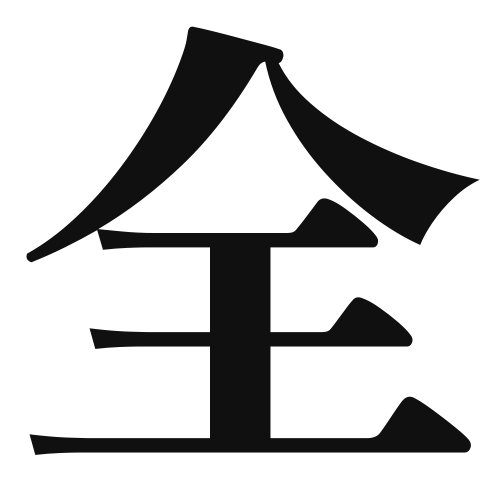1. Overview of Meaning
The kanji “全” (zen) means “whole,” “entire,” or “complete.” It conveys the idea of totality or entirety in various contexts.
2. Formation and Radical
Formation of the Kanji: The kanji “全” is classified as a phonetic-ideographic character (形声文字). It combines the meaning of completeness with a phonetic component.
Radical: The radical for “全” is “全” itself, which signifies the concept of entirety.
3. Examples of Usage
Common Words and Phrases: Some frequently used words that include “全” are:
- 全体 (ぜんたい, zentai) – whole, entire
- 全然 (ぜんぜん, zenzen) – completely, not at all (when used in negative sentences)
- 全力 (ぜんりょく, zenryoku) – full power, all one’s strength
Example Sentences in Daily Conversation:
- このプロジェクトは全体として成功しました。 (Kono purojekuto wa zentai to shite seikou shimashita.) – This project was successful as a whole.
- 彼は全力で試合に臨んだ。 (Kare wa zenryoku de shiai ni nozonda.) – He approached the match with all his strength.
4. Synonyms and Antonyms
Similar Kanji: A kanji with a similar meaning is “完全” (かんぜん, kanzen), which means “perfect” or “complete,” but it emphasizes flawlessness.
Antonyms: An antonym of “全” is “不全” (ふぜん, fuzen), which means “incomplete” or “deficient.”
5. Cultural and Historical Background
Relation to Japanese Culture: The concept of “全” is significant in Japanese culture, often reflecting the importance of harmony and completeness in various aspects of life.
Proverbs and Idioms: An example of a proverb that includes “全” is “全ては時の流れに任せる” (Subete wa toki no nagare ni makaseru), which means “Leave everything to the flow of time,” emphasizing acceptance and completeness in the passage of time.
